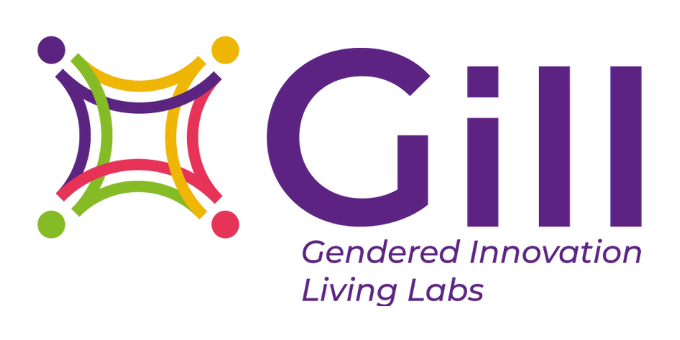GILL

GILL
Gendered Innovation Living Labs.
Gendered Innovation Living Labs – GILL is an EU-funded project addressing gender and diversity blindness in the Living Lab discourse and practices for: enabling organisational and cultural changes, enhancing professional development, increasing the integration of gender and diversity into product design, technologies, and innovation, and allowing gendered educational practices in the domains: Health and resilience, Green transition and Digital transformation.
The project’s main goal is to develop a pan-European collaboration and learning hub with the overall aim to become the open-gendered innovation framework for all European actors. The novelty that characterises GILL is that this project builds on the Living Lab methodology by adopting a co-creation and co-design approach to develop mechanisms such as methodologies, services, and tools through a series of 15 pilot cases across 8 European countries (United Kingdom, Romania, Spain, Germany, Italy, Czech Republic, Greece, and Denmark). The GILL mechanisms focus on transforming individual, team, and organizational practices with the purpose of integrating gender and diversity into product design, technologies, innovation, and policy design. To that aim, GILL fosters dialogue and co-creation activities among the 4 key actors of the Quadruple Helix model: academia, the public sector, industry, and citizens.
GILL, will develop a pan-European collaboration and learning hub based on the LL principles to become the open innovation framework for all European actors for open gendered innovation. The GILL “LL” will co-create sustainable mechanisms to increase gender responsive smart innovation and entrepreneurship (GRISE) by fixing practices and culture across the European ecosystems.
GILL will focus on 4 macro-objectives: a) to enable the organisational and cultural changes, b) to enhance professional development, c) to increase the integration of gender and diversity into product design, technologies and innovation, and d) to allow gendered educational practices. In parallel, GILL actions will act along a matrix of horizontal spheres of innovation (individual & team, tools & methods, innovation & products, societal processes) and three vertical priorities (Health and resilience, Green & Digital transition). GILL will be implemented through an iterative co-creation approach structured on a four-phases cycle – understand, co-design, implement, evaluate – repeated twice to incorporate the feedbacks and evaluation results in fine-tuned and validated results. 15 Action-Oriented Experimentations in 8 European countries will develop new approaches to GRSIE, test, evaluate the changes, and thereby validate GILL’s outputs in real-life open ecosystems.
Through this cycle, GILL will deliver a systemic review of barriers to GRSIE leading to the co-design of proven methodologies, services, and tools for GRSIE to be made available on a sustainable and easy to use platform. In line with the LL methodology, co-creation and open innovation will be fostered among the main actors of the Quadruple Helix model – citizens, government, industry, and academia – who will be engaged all along the project through different participatory activities.
